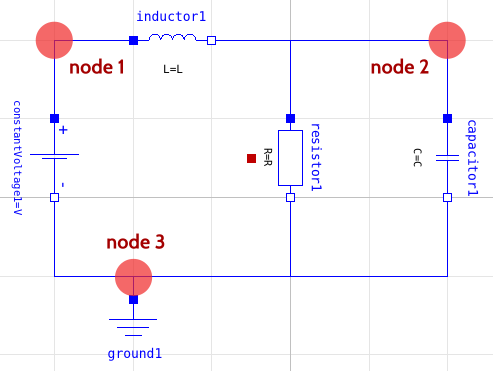5. Physical components in Modelica
Learning objectives
In this session, you’ll learn about physical components: what they are, how to connect them? These components are the main building blocks of most Modelica models.
Main ressources needed:
Michael Tiller’s online book “Modelica by Example” [Tiller-2014], second part “Object-Oriented Modeling”:
chapter Connectors
chapter Components
5.1. Connecting physical components
We start by considering an electrical system, since the representation of these systems in Modelica will fully reminds us of the usual representation on paper.
In OpenModelica’s Diagram View, drag and drop components from the Modelica.Electrical
(a subpackage of Modelica Standard Library) to create the simple RLC circuit of Fig. 5.1:

Fig. 5.1 connection of a few electrical components from the Modelica.Electrical standard package
Now switch to Text View and look for a set of lines starting
with a keyword, connect:
equation
connect(constantVoltage1.p, inductor1.p) annotation(/*[...]*/)
connect(capacitor1.p, inductor1.n) annotation(/*[...]*/)
/*[...]*/
Question
What is the relation between each of these lines to each electrical node?
Bonus: for one connect(...) line of you choice, you can fiddle with
the annotation which describes of the connection line is drawn.
For example, you can replace the color attribute color = {0, 0, 255}
by color = {255, 0, 0} and jump to the diagram view to see the result.
Theoretical Exercise
Using your knowledge of electrical circuits, what physical equations correspond to the connection of components, at each node?
In particular, for the node 2 on Fig. 5.1, list the set of equations
which are equivalent to the connection of inductor1.n, capacitor1.p
and resistor1.p.
In the general case, when connecting \(n\) ports, how many equations are there?
5.2. Vehicle suspension with components
Now use components from Modelica.Mechanics.Translational to recreate
the ODE model of a simplified Vehicle suspension.
Using the same parameters for mass, spring constant and damping, check that both models yields the same result.
Now, as with electrical circuit, what physical equations correspond to the connection of components?
5.3. Acausal connection
In Modelica, the connection of components is a generalized notion of the connection of electrical components in an electrical diagram.
Physical variables can be classified into:
potential (or across) variables
flow (or through) variables
Also, the connect equations corresponds to classical physical laws
potential equation: electrical wires are equipotential (no wire resistance)
flow equation: charge conservation at an electrical node
Now, you fill this table with variables and classical laws of the most usual domains:
Domain |
Potential variable |
Flow variable |
Potential equation |
Flow equation |
|---|---|---|---|---|
electricity |
voltage (V) |
current (A) |
equipotential wires |
charge conservation |
mechanics, 1D translation |
||||
mechanics, 1D rotation |
||||
thermal transfers |
||||
1D fluid mechanics |